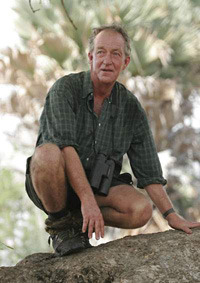 Richard is the son of an early well known Kenyan Game Warden, Jack Bonham. This meant he had an early and vivid introduction to Wildlife, the bush and conservation. After a spell of bush flying in the Sudan, Zaire and East Africa Richard went into the safari business, concentrating in walking safaris in the remoter and wilder parts of East Africa.
Richard is the son of an early well known Kenyan Game Warden, Jack Bonham. This meant he had an early and vivid introduction to Wildlife, the bush and conservation. After a spell of bush flying in the Sudan, Zaire and East Africa Richard went into the safari business, concentrating in walking safaris in the remoter and wilder parts of East Africa.
In the mid-80's, Richard negotiated a 300,000 acre concession on a Maasai-owned ranch, Mbirikani Group Ranch, where he still currently lives. This ranch forms an integral part of the Amboseli ecosystem. It became clear to Richard from the outset that the only way that the Wildlife and the habitat of the area could be sustained was to partner and involve the local community themselves, through economic incentive-based conservation enterprises, employment and participating in law enforcement themselves.
Richard pioneered the Community Game Scout concept in the late 80's by employing four local Maasai warriors to collect snares which were appearing in growing quantities, 20 years later this the project has expanded to employing and training over 100 game scouts from the local community and operating over most of the ecosystem. In 2009 alone, working closely with Kenya Wildlife Service, these dedicated scouts prosecuted over 500 poachers and illegal loggers. (This number could and should be doubled with better resources and logistical support. These scouts also double as general security for the area, protecting farms from crop raiding wildlife, following up stock theft and crime so providing an appreciated service to the community.)
Richard's conservation history is not limited to the law enforcement approach, The Maaasailand Preservation Trust which he started has played an integral part in setting up health clinics, schools and a Wildlife scholarship program that has put hundreds of students through school.
The Maasailand Preservation Trust also pioneered the a Predator Compensation project that now covers over 700.000 acres of the ecosystem, This economic incentive based approach is attempting to turn the tide of looming local extinction of predators. These predators, especially lion, are being killed in retaliation for their killing of livestock, on which the local community depend upon for their livelihood.
Rhino have also figured in Richard’s conservation history. In the mid 90's he was a key player in setting up the Selous Rhino Trust, and at home in the Chyulus, his scouts, together with KWS, are working around the clock to preserve what is probably the last unmanaged Black Rhino populations in Africa.
On November 26, 2014 in London, Richard was awarded The Prince William Award for Conservation in Africa at the Tusk Conservation Awards.
